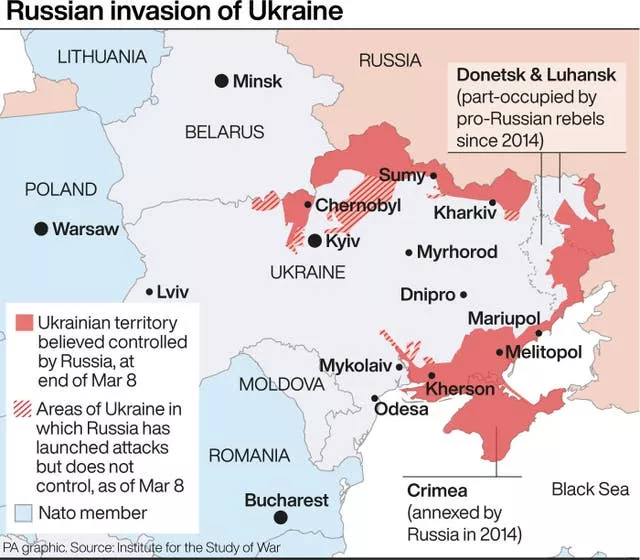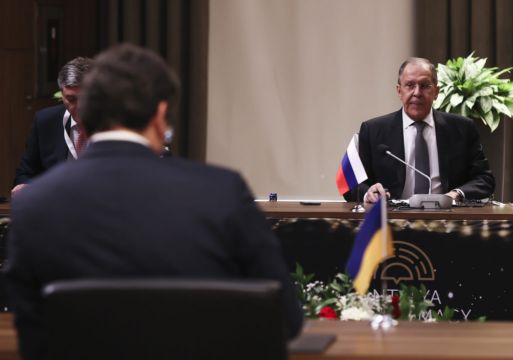An air strike on a hospital in the port city of Mariupol killed three people, including a child, the city’s council said as Russian forces intensified their siege of Ukrainian cities.
The announcement came as the top Russian and Ukrainian diplomats met for the first time since the war began.
The attack a day earlier in the besieged southern port city wounded 17 people, including women waiting to give birth, doctors, and children buried in the rubble. Bombs also fell on two hospitals in another city west of the capital.
The World Health Organisation (WHO) said it has confirmed 18 attacks on medical facilities since the Russian invasion began on February 24.

Two weeks since the invasion began, the sides held their highest-level talks so far.
Turkish President Recep Tayyip Erdogan said he hoped the meeting between Russian foreign minister Sergei Lavrov and his Ukrainian counterpart Dmytro Kuleba in a Mediterranean resort “will open the door to a permanent ceasefire”.
Mr Kuleba said the two sides discussed a 24-hour ceasefire but did not make any progress. He said Russia was still seeking “a surrender from Ukraine”.
“This is not what they are going to get,” he said, adding that he was willing to continue the dialogue.
Ahead of those talks, artillery fire was heard on the western edge of Kyiv, deputy interior minister Vadym Denysenko said.

He told Ukrainian TV channel Rada that residents had a “rather difficult” night on the outskirts of the capital, with Russian forces starting by targeting military sites but then hitting residential areas.
Some Ukrainian officials have called the medial facility attacked on Wednesday a children’s hospital, while others have called it a maternity unit. It was not clear if perhaps it hosted both services.
The ground shook more than a mile away when the series of blasts hit.
Explosions blew out windows and ripped away much of the front of one building.
Police and soldiers rushed to the scene to evacuate victims, carrying a bleeding woman with a swollen belly on a stretcher past burning and mangled cars.
Another woman wailed as she clutched her child. In the courtyard, a blast crater extended at least two floors deep.
“Today Russia committed a huge crime,” said Volodymir Nikulin, a top regional police official, standing in the ruins. “It is a war crime without any justification.”
President Volodymyr Zelensky said the Mariupol strike trapped children and others under debris.
“A children’s hospital. A maternity hospital,” he said in his nightly video address, switching to Russian to express horror at the strike.
“What kind of country is this, the Russian Federation, which is afraid of hospitals, afraid of maternity hospitals, and destroys them?”
Sharing video that showed cheerfully painted hallways strewn with twisted metal, Mr Zelensky urged the West to impose even tougher sanctions than the ones that have already plunged its economy into severe isolation, so Russia “no longer has any possibility to continue this genocide”.
Britain’s armed forces minister, James Heappey, said the strike “is a war crime” irregardless of whether it was deliberate or the result of “indiscriminate” fire into a built-up area.
On Thursday, Britain added more oligarchs to its sanctions list, including the owner of Chelsea Roman Abramovich.

In Zhytomyr, a city of 260,000 to the west of Kyiv, bombs fell on two hospitals, one of them a children’s hospital, mayor Serhii Sukhomlyn said on Facebook. He said there were no injuries.
The WHO said it has confirmed 10 people have been killed and 16 injured in attacks on health facilities and ambulances since the fighting began. It was not clear if its numbers included the assault on the hospital in Mariupol.
Two weeks into Russia’s assault on Ukraine, its military is struggling more than expected, but its President Vladimir Putin’s invading force of more than 150,000 troops retains possibly insurmountable advantages in firepower as it bears down on key cities.
Despite often heavy shelling on populated areas, American military officials reported little change on the ground over the previous 24 hours, other than Russian progress against the cities of Kharkiv and Mykolaiv, in heavy fighting. The officials spoke on condition of anonymity to assess the military situation.
Authorities announced new ceasefires to allow thousands of civilians to escape bombarded towns.
Mr Zelensky said three humanitarian corridors operated on Wednesday, from Sumy in the northeast near the Russian border, from suburbs of Kyiv and from Enerhodar, the southern town where Russian forces took over a large nuclear power station.
In all, he said, about 35,000 people got out. More evacuations were planned for Thursday from towns and cities under bombardment in eastern and southern Ukraine — including Mariupol — as well as the Kyiv suburbs.
People streamed out of Kyiv’s suburbs a day earlier, many headed for the city centre, as explosions were heard in the capital and air raid sirens sounded repeatedly. From there, the evacuees planned to board trains bound for western Ukrainian regions not under attack.

Civilians leaving the Kyiv suburb of Irpin were forced to make their way across the slippery wooden planks of a makeshift bridge, after the Ukrainians blew up the concrete span leading to Kyiv days ago to slow the Russian advance.
With sporadic gunfire echoing behind them, firefighters dragged an elderly man to safety in a wheelbarrow, a child gripped the hand of a helping soldier, and a woman inched her way along, cradling a fluffy cat inside her winter coat. They trudged past a crashed van with the words “Our Ukraine” written in the dust coating its windows.
“We have a short window of time at the moment,’’ said Yevhen Nyshchuk, a member of Ukraine’s territorial defence forces. “Even if there is a cease-fire right now, there is a high risk of shells falling at any moment.”
Previous attempts to establish safe evacuation corridors over the past few days largely failed because of what the Ukrainians said were Russian attacks.
Mr Putin, in a telephone call with Germany’s chancellor, accused militant Ukrainian nationalists of hampering the evacuations.
International Red Cross spokesman Jason Straziuso said safe passage corridors are welcome but have to be well planned, with details agreed on by all sides including the right to bring in food, clean water, medical supplies and other necessities.
Such guarantees are vital for places like Mariupol, a city of 430,000 on the Sea of Azov, where Mr Zelensky’s office said about 1,200 people have died during the nine-day siege.
“We haven’t been able to resupply our teams in recent days in Mariupol, for example,” Mr Straziuso said.

Local authorities hurried to bury the dead from the past two weeks of fighting in a mass grave in the city. Workers dug a trench some 25 metres long at one of the city’s old cemeteries and made the sign of the cross as they pushed in bodies wrapped in carpets or bags.
Nationwide, thousands are thought to have been killed, both civilians and soldiers, since Mr Putin’s forces invaded. The UN estimates more than two million people have fled the country, the biggest exodus of refugees in Europe since the end of the Second World War.
The fighting knocked out power to the decommissioned Chernobyl nuclear plant on Wednesday, raising fears about the spent radioactive fuel stored there that must be kept cool. But the UN nuclear watchdog agency said it saw “no critical impact on safety” from the loss of power.
Ukrainian deputy prime minister Iryna Vereshchuk pleaded on Thursday with the Russian military to allow access for repair crews to restore electricity to the plant, and to fix a damaged gas pipeline in the south that has left Mariupol and other towns without heat for days.
The crisis is deteriorating as Moscow’s forces intensify their bombardment of cities in response to what appears to be stronger Ukrainian resistance and heavier Russian losses than anticipated.
The Biden administration warned Russia might seek to use chemical or biological weapons in Ukraine and rejected Russian claims of illegal chemical weapons development there.
This week, Russian Foreign Ministry spokeswoman Maria Zakharova — without evidence — accused Ukraine of running chemical and biological weapons labs with US support.
White House press secretary Jen Psaki called the claim “preposterous” and said Russia might be trying to lay the groundwork for its own use of such weapons against Ukraine.







